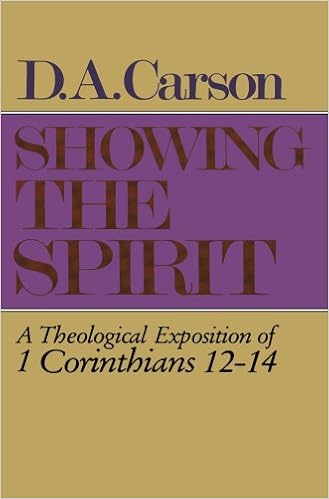
Carson, D. A. Showing the Spirit: A Theological Exposition of 1 Corinthians 12-14. Grand Rapids, MI: Baker Books, 1987.
Carson steers a middle path between deistic cessationism and slappy clappy anything-goes charismania. He endorses the substance behind Grudem’s thesis while calling particular details into account. This is the best, sane treatment of the charismatic movement.
While there are some nuances between “charismata” and “pneumatikon,” there isn’t enough to warrant a full doctrinal difference or application.
Notes and argument:
* The “perfect” in 1 Cor. 13 cannot refer to the completion of the canon, since that would have been anachronistic for Paul.
* Paul makes no distinction between regular gifts and super gifts (Carson 34). 12:7 links it all: each gift is for the manifestation of the Spirit. Each believer is given some manifestation and rather than divide it into super and regular, Paul’s argument does the exact opposite: don’t think one is better than the other.
* The ordering of the gifts doesn’t matter. Paul changes the order every time (35ff).
*The chapter on tongues is interesting. He leans towards their being actual languages, and hypothetically grants they continue today. He hedges his bets by saying no one does it correctly. He draws upon an interesting article by Poythress and notes that the content of glossalia that tongue-speech is coded language (all languages have codes that repeat). So even if it is “gibberish,” if it has patterns then it still counts as a language. Poythress gives the following example:
Praise the Lord, for his mercy endures forever.
Remove the vowels to achieve
Prs th lrd fr hs mrc ndrs frvr
This isn’t so strange, since some Semitic languages don’t have vowels.
Now we are going to remove the spaces
Prsthlrdfrhsmrcndrsfrvr
This still counts as a language, since most early languages didn’t have spaces.
Now we are going to add an “a” between each consonant. It might sound gibberish, but it has all the necessary conditions for a language. You can play with it and it will sound gibberish, but it still fits as a “language.”
Prophecy
Does Grudem’s view mean that each new prophecy means new revelation? No.
- a) It doesn’t seem like Philip’s daughters thought they were adding to the canon.
- b) The parallel with OT false prophets really doesn’t work. In the OT if a prophet were proved true, then he was good to go. Sort of like tenure. Not so with NT prophets. Their oracles are to be carefully weighed (presumably again and again).
Were Tongues a Covenantal Sign?
It is true that Paul is probably alluding to Isaiah 28:16 in 1 Cor. 14:22ff. Does this mean that each act of tongue-speaking in the church was a covenantal judgment on Jews for their unbelief? It’s hard to see how that could be the case. Carson shows some problems:
- a) The “unbeliever” for Paul is a Gentile, not a Jew. There is no way that this can function as a covenantal sign against the Jewish unbeliever.
Carson ends the book with a rather pointed critique of charismatic excesses. That’s understandable, since he spent the previous 150 pages debunking cessationist exegesis.